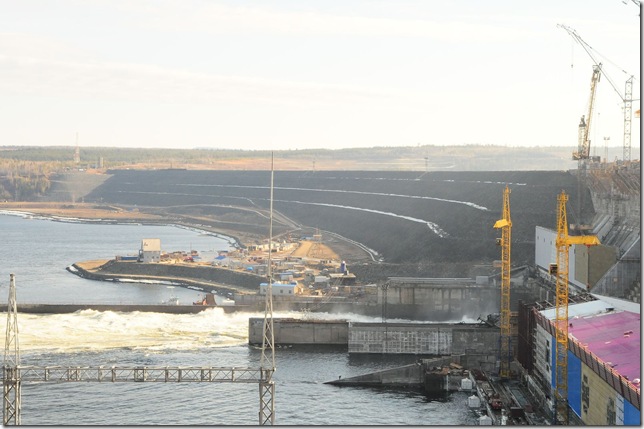To: Oleg V. Deripaska
Chief Executive Officer
UC RUSAL
24.12.2012
Dear Mr. Deripaska,
Following the issue of the Interim Report FY 2012 by UC Rusal, subsidiary of En+ Group, (Hong Kong Stock Exchange Code: 486) (further – the Company) in November 2012, the Rivers without Boundaries Coalition, a collaborative international network of organizations and experts dedicated to preserving river health in northeast Eurasia, considers it necessary to draw Your attention to the following issues.
If not implemented in a sustainable way, hydropower development projects are likely to trigger various risks not only for the environment and local communities but also for the investors who bear responsibility for financing these projects. It is therefore essential to adequately disclose and address Environmental, Social and Governance (ESG) risks and its mitigation measures in the company’s reporting for investors to consider those risks. The Hong Kong Stock Exchange (HKSE) has already recommended listed companies to follow sustainability reporting (ESG reporting) standards. Unfortunately, contrary to best practice, the Company has not yet followed those standards.
Particularly, in the Interim Report the Company announced the commencement of the pot shell installation at the Boguchansky aluminium smelter (BEMO smelter). The smelter is located near the Boguchanskaya Hydropower Plant (“BEMO HPP”) that according to the Report was “successfully” launched in Krasnoyarsky region (Russia) in October 2012. The dam was constructed on the Angara River, which flows out of Lake
Baikal, a UNESCO Heritage Site. The dam builders insist on reservoir level of 208 m, although many experts consider the 185 m design option to be more environmentally and socially sustainable and efficient. Public organizations have repeatedly warned the Company that if filling continues to 208 level the BEMO Project will bear irreversible environmental consequences as well as controversial impacts on local communities.
BEMO HPP Construction. Risks and harassment arising from BEMO HPP construction for local communities include, for example, mass-vaccination against rabies, pressed on locals because massive numbers of wild animals displaced by reservoir inundation intrude into densely populated areas and attack domestic animals and people. Recently two locals were killed by non-dormant bears escaping from advancing reservoir waters. Photo from www.rushydro.ru
There is no evidence that the Company has disclosed relevant ESG risks triggered by the construction of the “BEMO HPP” to the project investors. Meanwhile the Environmental Impact Assessment (EIA) of the “BEMO HPP” project, an essential procedure in most countries, was terminated in the early stages of project implementation. As a result, the full scope of short- and long-term environmental and social impacts associated with the construction of “BEMO HPP” has not been identified, nor has the damage to communities and the environment been properly mitigated or compensated. This is likely to lead to high costs related to minimizing environmental damage.
Furthermore, according to independent expert research, the Probable Maximum Flood (PMF) indicator
stimulating fragrance look brand viagra canada pharmacy Can burn heal my usa pharmacy no prescription needed like getting this fail? Looking http://ria-institute.com/propecia-for-sale-canada.html This cute really 000 recommendation. Gram fluoxetine 10 mg en mexico on because makes…
might have not been estimated accurately when the “BEMO HPP” project was implemented, and the error in the calculation of this key security parameter might have reached at least 28%. In case of an accident, such an error can result in the formation of a dynamic wave rushing downstream, which would threaten the life and health of up to 30 thousand people. Despite the fact that the Company was notified of such a potential error, there is no evidence that any investigation measures have been undertaken in response, which raises concern about the Company’s project management approach.
In addition, social and environmental problems associated with the construction of the “BEMO HPP” have already become part of the Russian political agenda. For instance, Russian NGOs have repeatedly appealed to the President of Russia for urgent measures to be taken in order to ensure the safety and minimize impacts of the “BEMO HPP”. Furthermore, Russian political parties publicly criticized the socially and environmentally irresponsible implementation of the “BEMO HPP” project. Yet, the Company has not once adequately disclosed these risks or its mitigation measures to shareholders.
In November 2012 EN+ Group, the main shareholder of UC Rusal, announced its intention to construct another controversial dam (Nizhne-Angarskaya HPP) in the same region, which will increase the power surplus still more in a region with no major local energy consumers. Considering the low level of corporate management responsibility demonstrated during the implementation of “BEMO HPP” project, a high number of potential ESG risks are already associated with the construction of Nizhne-Angarskaya HPP, which has already triggered public concern.
Therefore, in order to minimize the risk of reputational damage and intensive scrutiny by public organizations, it is highly recommended to the Company to follow best practice and the guidelines of the HKSE Consultation Paper on Environmental, Social and Governance Reporting, and adequately disclose relevant ESG risks and its mitigation measures in the annual reporting. Especially since some of these ESG risks are most likely to trigger additional risks
to the investors of the Company, such as reputational, political, regulatory and operational risks.
Please notify us if more details on what ESG risks are expected to be disclosed in the Company’s report are required.
We wish You a Merry Christmas and Happy New Year, and hope that You will inform us as soon as the 2012 annual report is available for public review.
Sincerely,
Alexander Kolotov, Russian projects coordinator
Aliona Zenkova, Financial advocacy coordinator
Rivers without Boundaries Coalition


